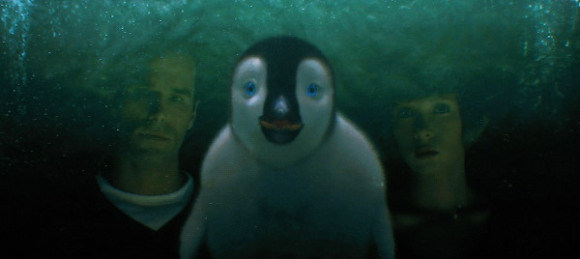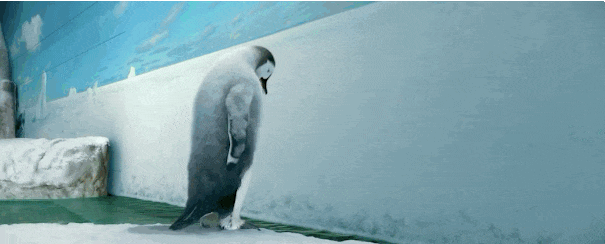Happy Feet (Dir. George Miller, 2006) is a film normally associated with the representation of environmental issues, encouraging environmental awareness and consciousness of the animals worldwide affected by human actions. It also presents the theme of individuality, with the main character Mumble shunned for being different but eventually accepted into the penguin community after he is able to prove to the leaders of the Emperor Penguins that rather than causing the lack of fish he is actually a hero. He persuades the humans to stop over-fishing by using his individuality (his ‘happy feet’) to make them see that the penguins deserve protection. What is often overlooked is the scene where Mumble finds himself in a zoo, confronted with ‘aliens’ (humans) who he tries to tell ‘you’re stealing our fish!’, to no avail. Almost forgetting where he comes from, he is seen ‘all but los[ing] his mind’, raising the ethics of keeping animals in captivity and representing the idea of language and communication between humans and animals. Both themes are somewhat neglected throughout the rest of the film and hardly reconciled as the film goes proceeds, building up to the climactic ending which focuses on the wild penguins instead.

This display, the film’s first human-penguin interaction, cleverly reverses the roles as seen from Mumble’s point of view, breaking down the human-animal boundary. The narrator describes the humans as ‘big ugly penguins without feathers on their fat, flabby faces’ and strikingly reminds us that just because we cannot understand the penguins doesn’t mean that they do not feel and think. Mumble exclaims ‘Am I not making myself clear? I’m speaking plain penguin!’, yet as a viewer we witness that ‘plain penguin’ is actually just him squawking at the on looking humans. The narrator describes how ‘after three days he would lose his voice’, and thus we see Mumble’s attempts to communicate fail. Ultimately however, it is Mumble’s ‘disability’ that the humans relate to; by mimicking the young girl’s taps on the glass with his feet he is able to communicate the one truth crucial to saving his species: penguins aren’t as unlike humans as we believe they are. The juxtaposition of the two scenes, one where Mumble uses his voice and the humans watching all disperse, uninterested, and the other where the crowd increases in excitement as he tap-dances before their eyes highlights this issue of language. It therefore brings into question our methods for judging sentience; how important is our ability to communicate with animals in deciding their worth? Or should we assign worth to all animals equally? Unfortunately, the strength of the scene in highlighting the cruelty of captivity is lost as the camera zooms out in a dramatic extreme long shot of first the city, then the world, then the galaxy, which both literally and figuratively focuses on the ‘bigger picture’ of environmentalism rather than the ethics of captivity. Mumble is then allowed to return home, leaving the other penguins in the zoo, and all is presented as well.

Further Reading
- Josh Tyler, ‘Happy Feet’, Cinema Blend, (No date) http://www.cinemablend.com/reviews/Happy-Feet-1917.html [Accessed 11/01/2016]